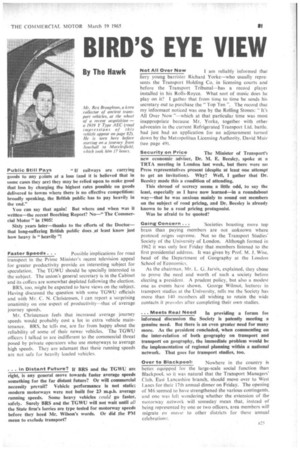BIRD'S EYE VIEW
Page 83

If you've noticed an error in this article please click here to report it so we can fix it.
By The Hawk
Public Still Pays "If railways are carrying
goods to any points at a loss (and it is believed that in some cases they are) they may be relied upon to make good that loss by charging the highest rates possible on goods delivered to towns where there is no effective competition: broadly speaking, the British public has to pay heavily in the -end."
You can say that again! But where and when was it written—the recent Beeching Report? No—" The Commercial Motor" in 1905!
Sixty years later—thanks to the efforts of the Doctor— that long-suffering British public does ,at least know just how heavy is "heavily "!
Faster Speeds. Possible implications for road
transport in the Prime Minister's recent television appeal for greater productivity provide an interesting subject for speculation. The TGWU should be specially interested in the subject. The union's general secretary is in the Cabinet and its coffers are somewhat depleted following the election.
BRS, too, might be expected to have views on the subject. Having discussed the question with some TGWU officials and with Mr. C. N. Christensen, I can report a 'surprising unanimity on one aspect of productivity—that of average journey speeds.
Mr. Christensen feels that increased average journey speeds would probably cost a lot in extra vehicle maintenance. BRS, he tells me, are far from happy about the reliability of some of their newer vehicles. The TGWU officers I talked to are indifferent to the commercial threat posed by private operators who use motorways to average high speeds. They are adamant that these running speeds are not safe for heavily loaded vehicles.
. . . in Distant Future? If BRS and the TGWU are right, is any general move towards faster average speeds something for the far distant future? Or will commercial necessity prevail? Vehicle performance is not static; modern motorways were not built for 23 m.p.h. average running speeds. Some heavy vehicles could go faster, safely. Surely BRS and the TGWU will not wait until all the State firm's lorries are type tested for motorway speeds before they heed Mr. Wilson's words. Or did the PM mean to exclude transport? Not All Over Now I am reliably informed that
fiery young barrister Richard Yorke—who usually represents the Transport Holding Co. in licensing courts and before the Transport Tribunal—has a record player installed in his Rolls-Royce. What sort of music does he play on it? I gather that from time to time he sends his secretary out to purchase the "Top Ten ". The record that my informant noticed was one by the Rolling Stones: "It's All Over Now "—which at that particular time was most inappropriate because Mr. Yorke, together with other advocates in the current Refrigerated Transport Ltd. battle, had just had an application for an adjournment turned down by the Metropolitan Licensing Authority, David Muir (see page 49).
Security on Price The Minister of Transport's
new economic adviser, Dr. M. E. Beesley, spoke at a TRTA meeting in London last week, but there were no Press representatives present (despite at least one attempt to get an invitation). Why? Well, I gather that Dr. Beesley made this a condition of attending.
This shroud of secrecy seems a little odd, to say the least, especially as I have now learned—in a roundabout way--that he was anxious mainly to sound out members on the subject of road pricing, and Dr. Beesley is already known to be a road pricing protagonist.
Was he afraid to be quoted?
Going Concern ... Societies boasting more top
brass than paying members are not unknown where protocol reigns supreme. Not so the Transport Studies' Society of the University of London. Although formed in 1962 it was only last Friday that-members listened to the first presidential address. It was given by Prof. M. I. Wise, head of the Department of Geography at the London School of Economics.
As the chairman, Mr. L. 0. Jarvis, explained, they chose to prove the need and worth of such a society before electing a president. A prudent policy, but also a modest one as events have shown. George Wilmot, lecturer in transport studies at the University, tells me the Society has more than 140 members all wishing to retain the wide contacts it provides after completing their own studies.
... Meets Real Need In providing a forum lot
informed discussion the Society is patently meeting a genuine need. But there is an even greater need for many more. As the president concluded, when commenting on the inter-relation of both geography on transport and transport on geography, the immediate problem would be the implementation of regional planning within a national network. That goes for transport studies, too.
Over to Blackpool: Nowhere in the country is better equipped for the large-scale social function than Blackpool, so it was natural that the Transport Managers' Club. East Lancashire branch, should move over to West Lancs. for their 17th annual dinner on Friday. The opening' of M6 seemed to have strengthened the various contingents, and one was left wondering whether the extension of the motorway network will someday mean that, instead of being represented by one or two officers, area members will migrate en mtP,%e to other districts for these annual celebrations..












































































































































